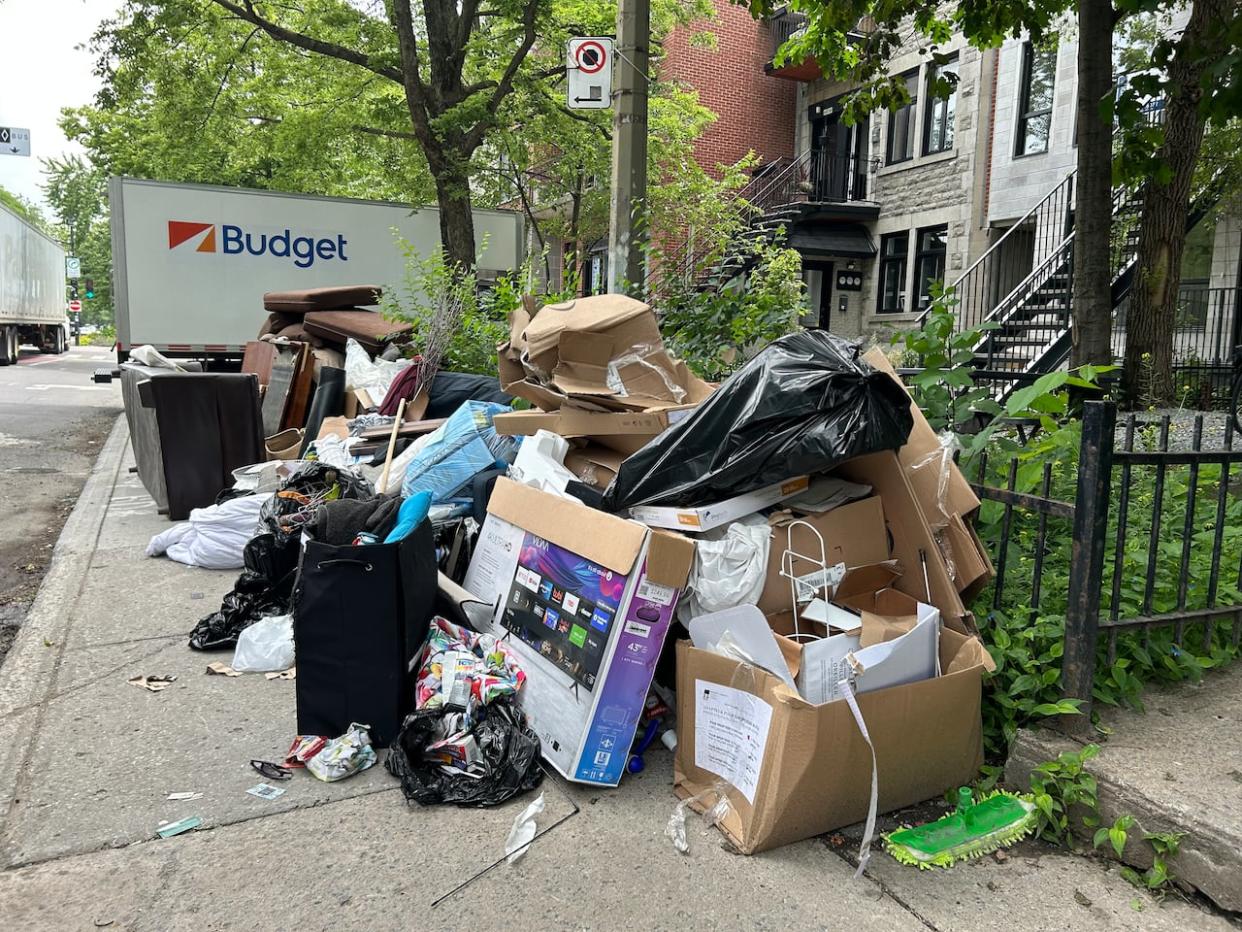What happens to Montrealers' moving day waste?

Next to a shipping container towering over Marie-Anne Street in Montreal's central Plateau neighbourhood, passersby pick through an assortment of furniture laid out under a small white tent.
The items are a selection from the record seven tonnes of furniture and household items the organization Société pour l'action, l'éducation et la sensibilisation environnementale de Montréal (SAESEM) has collected over the past two weeks via its shipping container depot and home collection service.
They are only a piece of the waste puzzle Quebec's annual July 1 moving day creates in the city, which typically generates an extra 50 tonnes of trash each year.
Last year at this time, the organization had collected just two tonnes during its RebutRécup campaign which started June 19 and ends July 7.
"We're exploding our scores," said Garance François, a project manager for SAESEM.
"There aren't many other options. It's super difficult to get rid of furniture in Montreal, aside from selling it on [Facebook] Marketplace."

Garance François, a project manager for SAESEM, says her organization collected more than three times the amount of household items it did at this time last year. (Rowan Kennedy/CBC)
The group typically redistributes the items to organizations who give them away or sell them at a low cost to people in need, such as asylum seekers.
This time, François says SAESEM collected so much stuff that they held a kind of garage sale on Marie-Anne and Bordeaux streets.
"The goal is to avoid furniture ending up in the landfill," she said.
RebutRécup collects most household and clothing items, except for mattress and upholstered furniture like couches or sofa chairs. The group is currently partnered with Plateau-Mont-Royal, but it is hoping more Montreal boroughs and nearby municipalities will work with them in the future.
RebutRécup, a campaign from June 19 to July 7, aims to reduce the amount of furniture that ends up in landfill around Moving Day. (Rowan Kennedy/CBC)
Recycling advocate Karel Ménard says he's seeing larger items left on the curb this year.
"Mattresses, pieces of furniture, appliances. It was as if entire households had been thrown onto the street," said Ménard, who is the head of the Front commun québécois pour une gestion écologique des déchets.
He speculated that rising rents have people moving into smaller apartments, where all their belongings won't fit.
A severe housing crisis in the province has left more than 100 people without homes this July 1 in Montreal, and a total of 700 in the province.
Waste winds up in landfill
The City of Montreal says the waste removal from the aftermath of July 1 will take about a week. It's encouraging people to take large items and electronics to the city's eco-centres, open seven days a week from 8 a.m. to 6 p.m.
But those big piles lying on the side of the road, only to get soaked in the rain? City spokesperson Philippe Sabourin says anything that ends up in an unsorted pile on the street will likely wind up in a landfill.
"When you have all mixed together items, it's impossible for the city to sort the items. So everything will go to the dump," Sabourin said.

Philippe Sabourin, a spokesperson for the City of Montreal, said 280,000 tonnes of waste are processed every year at the city's eco-centres. (Rowan Kennedy/CBC)
It's not exactly the city that does the sorting, though. Montreal contracts much of its waste collection out to private companies.
And François, of SAESEM, says that while eco-centres recycle some materials, such as wood and heavy metals found in electronics, her group wants to simply reduce the amount of stuff that gets thrown out.
The organization makes it easy for people to get rid of items by offering to pick them up and by placing its shipping container in an easy-to-access residential spot, like the corner of Marie-Anne and Bordeaux this year.
She said this makes it easier for those who don't have access to a car to bring items to an eco-centre.
Ménard says Joliette, a municipality about 75 kilometres northeast of Montreal, found a solution by lending residents an electric pickup truck.
Many of the people at the Plateau eco-centre Monday were there to dispose of renovation debris. (Rowan Kennedy/CBC)
On a trip to the Plateau eco-centre Monday, CBC News observed many people arriving with cars and trucks full of construction materials, as well as some people doing ritual junk purges — but no one having recently moved. One couple arriving in a U-Haul were landlords who had just spent six hours clearing waste from previous tenants.
Ménard says he gets calls from journalists on moving day every year, and that while the exposure may lead to more awareness of the issue of waste, he longs for the day it's no longer needed.
"Not only are we buying things that don't last long, but if on top of that we're throwing out items that are perfectly fine. One day we're going to pay for this kind of consumption," he said.


